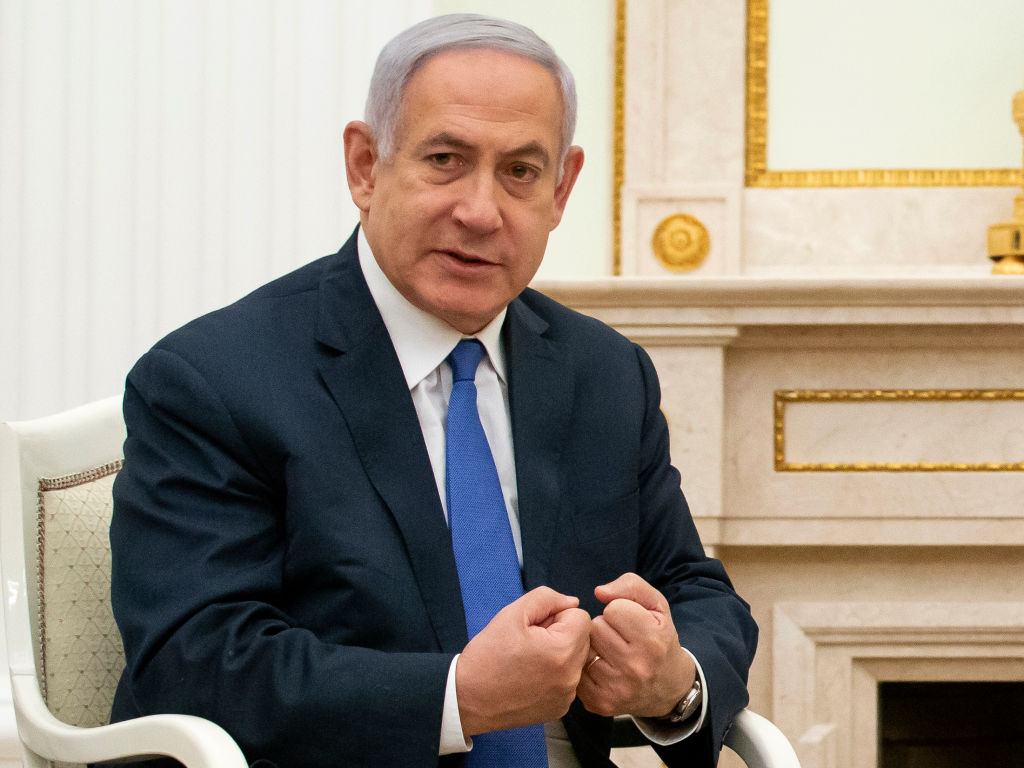
Israeli Prime Minister Benjamin Netanyahu appeared on NBC’s Meet the Press to discuss Israel's war on Hamas in Gaza. After an attack by the militant group killed 1,200 people in Israel on Oct. 7, the Israel Defense Forces launched an air and ground offensive of Gaza in an attempt to defeat Hamas. The assault on Gaza has killed more than 11,000 people, the Hamas-run health ministry has said. Concerns grow over the humanitarian crisis, as many civilians in Gaza lack access to electricity, food, and water.
Hundreds of thousands of people have taken to the streets in protest around the world, calling for an immediate ceasefire and protection of civilians in Gaza. U.S. leaders and other Israeli allies have stood by Israel’s right to defend itself, while saying Israel must respect international human rights laws to protect civilians. However, French President Emmanuel Macron spoke out in a BBC interview on Nov. 11, arguing that there was "no justification" for the bombing and that a ceasefire would benefit Israel.
Below are key moments from Netanyahu’s interview with Kristen Welker on the Nov. 12 episode of Meet the Press.
Netanyahu says "we will win this war”
Welker asked Netanyahu whether Israel can win the war without global support. “We will win this war, because we have no other choice,” Netanyahu said. “There is no life for us, there’s no future for us and our neighbors, if we allow the axis of terror, led by Iran, Hezbollah, Hamas, the Houthis and their minions to dominate,” he continued, referencing militant groups based in Lebanon, Gaza and Yemen respectively.
Netanyahu said Israel was fighting a “just battle of civilization against barbarism,” and compared his military to the allies against the Nazis in World War II.
Netanyahu calls out "those who protest for Hamas"
Masses of protesters, including students, have taken to the streets in the U.S. and elsewhere to express support for Palestine. The protesters’ overriding calls have been for an immediate ceasefire and the protection of Palestinian civilians.
Referencing Hamas, Netanyahu said that any protesters “who protest for Hamas, you’re protesting for sheer evil... Who do you protest against? Do you protest against the Nazis? Or do you protest against the allies?... It’s an indictment of higher education in some of our universities.”
Netanyahu says there "could be a deal" on hostages
Hamas took more than 200 people hostage during its attack and so far has released four. Netanyahu said “there could be” a deal on hostages, “but I think the less I say about it, the more I’ll increase the chances that it materializes.” He told Welker that Israel wasn’t “close at all” to a deal until his military started its ground operation in Gaza. He argued any possible deal was the result of military pressure on Hamas.
Netanyahu says Gaza must be "demilitarized and deradicalized"
Welker quoted Netanyahu as saying in the past that Israel will control Gaza for as long as needed. When asked if he would support an international force managing the region after the war, he argued that Gaza has to make sure it does not pose "a threat to Israel," later adding that Gaza has to be "demilitarized and deradicalized."
Expanding his thoughts further, he said: "The only force right now that can guarantee that Hamas, that terrorism, does not reappear and take over Gaza again, is the Israeli military. Overall military responsibility will have to be in Israel."
U.S. Secretary of State Antony Blinken has addressed Gaza’s future, saying Hamas can’t run Gaza and Israel can’t reoccupy it, although its troops may be there temporarily.
Netanyahu claims struggling Shifa hospital in Gaza refused offer of fuel
In response to reports of Gaza’s main hospital suffering from power outages amid intense fighting around the medical facility, Netanyahu claimed that Israel offered Shifa Hospital fuel, but “they refused” to accept.
Netanyahu said: "We offered actually last night to give them enough fuel to operate the hospital, operate the incubators and so on, because we obviously have no battle with patients or civilians at all. Every civilian death, every dead baby, is a tragedy,” he said. “They refused it.”
The IDF provided more details on this claim via Telegram, saying soldiers placed 300 liters of fuel at the entry to the hospital, sharing a video. TIME could not independently verify these statements or the video.
TIME has reached out to the Hamas-run Palestinian Health Authority and Hamas' spokespeople for comment on Netanyahu and the IDF’s statements.
Following the Oct.7 assault by Hamas, Israel didn't allow fuel to enter Gaza over fears it would be used by Hamas for military purposes. The U.N. and other aid organizations issued firm warnings that hospital patients could die if fuel were to run out.
More Must-Reads from TIME
- The New Face of Doctor Who
- Putin’s Enemies Are Struggling to Unite
- Women Say They Were Pressured Into Long-Term Birth Control
- Scientists Are Finding Out Just How Toxic Your Stuff Is
- Boredom Makes Us Human
- John Mulaney Has What Late Night Needs
- The 100 Most Influential People of 2024
- Want Weekly Recs on What to Watch, Read, and More? Sign Up for Worth Your Time
Contact us at letters@time.com